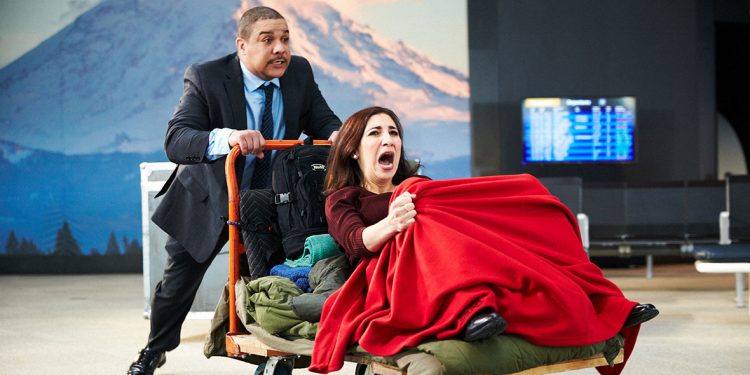By Gregory Moomjy
One of the greatest facets of the modern opera scene is the depth and breadth of subject matter for new opera. Much has changed in opera repertoire even since the career of Benjamin Britten, who only passed in 1976. His greatest operas—such as Billy Budd and The Turn of the Screw, and even some of his lesser-known works like Gloriana—have their roots either in classic works of literature or in momentous state occasions, such as the coronation of Elizabeth II.
By contrast, the current opera scene is replete with works based on the lives of Julia Child, Anna Nicole Smith, and other subjects that some might not otherwise see get the operatic treatment. One such example is Jonathan Dove’s Flight. This opera was available for streaming April 23-25, 2021, by Seattle Opera as part of a season which pairs slimmed down productions that follow covid guidelines with young artist recitals. New York audiences would know the piece from recent performances at Manes and Julliard, but it is still not performed as regularly as it deserves.
The performance took place at The Museum of Flight and the singers were accompanied by a prerecorded orchestral track. This was a good decision, as unlike other pieces in Seattle Operas current season, such as L’elisir d’amore, the orchestration is extremely inventive and colorful, therefore the performance would lose quite a bit if it were solely accompanied by piano. Here Viswa Subbaraman the conductor brought out both the energy and sentimentality of the work. A particular note was an ensemble where the characters sing about what they intend to do upon arrival at their respective destinations. Here he brought out parallels to Verdi’s Falstaff and Puccini’s Gianni Schicchi. The piece composed by Johnathan Dove is a modern take on a good old fashioned comic opera in the style of Rossini. There are very few arias and most of the action is predicated-on ensembles. In this way the work is basically a number opera.
As its name suggests, this piece takes place at an airport. But it is not about anything as mundane as simple air travel. Instead, the piece examines the reasons why people fly—whether it’s a diplomatic couple with a baby on the way who are worried about life as new parents, or a couple travelling together for a romantic weekend only to discover the husband’s latent homosexuality, or even a pair of flight attendants, who despite having no actual destination, are wondering about the future of their relationship. The opera explores what travel means to each of us on an individual level.
One of the works more poignant features is the inclusion of a refugee played by a countertenor. This refugee cannot leave the airport, as he does not have the appropriate documentation. He is waiting on his brother who is bringing him the needed papers. Historically countertenors and their castrati ancestors have been used to portray characters that were somehow not of this world. These range from mythical deities to rulers of antiquity. In the latter case, the high range portrayed them as aristocrats that were morally above everyone else. Here however, casting the refugee as a counter tenor helped further the idea that he was permanently in a state of limbo and could never really fit in with the other characters. In this performance, the role was sung affectingly by Randall Scotting, whose voice was sweet but also had a certain depth to it.
The refugee is in a somewhat abusive relationship with the air traffic controller. As her title suggests, she’s someone who likes planes better than people and spends the entire opera encased in the air traffic control tower. Almost like a modern Deus Ex Machina. Although she never meets the refugee in person, she fluctuates between, love for him and rage at his perceived betrayals. The role is fiendishly difficult and reminiscent of Mozart’s Queen of the Night, although as with the use of coloratura sopranos in more modern operas, she doesn’t have that much ornamentation, but rather she lives in the stratosphere, both literally and figuratively. In a way reminiscent of Ariel, the air spirit from The Tempest, by Thomas Ades. Sharleen Joynt, in her company debut, made quick work of this treacherous part. She was particularly adept when portraying the air traffic controller’s wrath.
The rest of the cast featured several standout performances. Sarah Larsen brought sweetness to the stewardess and her partner Joseph Lattanzi, made for a sly and sexy flight attendant. Aubrey Allicock brought his silky baritone to the role of the diplomat and Karin Mushegain was compelling as his wife. Given the fact that her character gives birth at the airport. She had the unenviable task of singing her labor pains. Margaret Gawrysiak brought her rich mezzo to the woman waiting for her fiancé, who never shows up. All in all, the good people at Seattle opera, can congratulate themselves on putting together an engaging performance of a seldom heard, rewarding, yet demanding opera. In the best of times, Flight calls for a cohesive ensemble cast as well as an orchestra capable of shifting between baroque clarity and Wagnerian heft. The fact that Seattle Opera was able to deliver all this during a pandemic is no small accomplishment.
Lastly, the opera examines the miraculous phenomenon of air travel, as the invention that makes all of these scenarios and relationships possible. This afforded the creative team, headed by director Brian Staufenbiel, some novel opportunities. During an ensemble in which the characters watch a plane take off, the scene shifts to a cockpit, where the singers appear on the many monitors and dials, which help planes fly.
Seattle Opera season continues with performances of Tosca this June.

